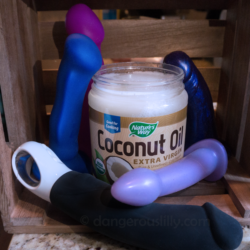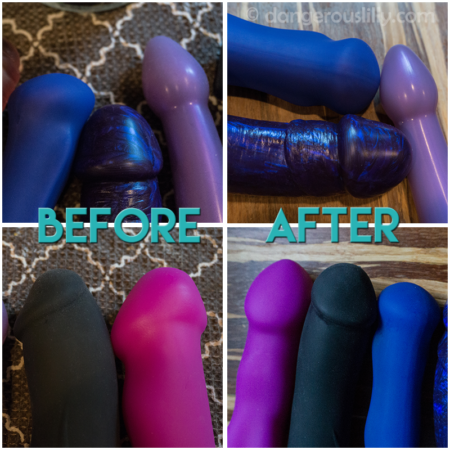Coconut Oil and Silicone Sex Toys
 The world is divided on their feelings about coconut oil as lube, but I didn’t know that people truly believed that coconut oil and silicone sex toys were incompatible. It doesn’t work well as a lube for everyone; it’s not the perfect lube (there isn’t one perfect lube). But it does work well for many folks! It’s not good for those who use condoms – unless you can use the hard-to-find polyurethane or nitrile condoms – but it is great with all body-safe sex toy materials.
The world is divided on their feelings about coconut oil as lube, but I didn’t know that people truly believed that coconut oil and silicone sex toys were incompatible. It doesn’t work well as a lube for everyone; it’s not the perfect lube (there isn’t one perfect lube). But it does work well for many folks! It’s not good for those who use condoms – unless you can use the hard-to-find polyurethane or nitrile condoms – but it is great with all body-safe sex toy materials.
I’ve talked about the fact that coconut oil and silicone sex toys are compatible but then recently a sex toy shop published a Very Incorrect article on why they hated coconut oil as lube. Among their many opinions touted as (incorrect) facts was that they claimed it would destroy silicone sex toys, making them look “decayed”. That’s…that’s not a thing that happens…ever.
Despite myself and other bloggers chiming in about their long-time use of coconut oil lube with silicone sex toys, the shop’s social media manager was not swayed and they got really shitty with folks. But since they were not the only ones surprised that coconut oil and silicone sex toys can have a long, happy marriage I decided to run a little experiment. Y’all know how much I love experiments.
Geeky Metrics
I wanted to be sure I could tell you that there was no change to the silicone with no doubts, so I had to use proof beyond my pictures and my words. I borrowed a durometer to tell me the shore strength (squish level) of the sex toys before and after their exposure to coconut oil. I weighed them in grams to make sure that no oil was absorbed. I photographed them before and after each time they bathed in coconut oil.
![]() The first time I put the coconut oil on the sex toys I had melted the oil and brushed it on with a basting brush. I did it this way because once the coconut oil is in your body it’s warmed up enough to liquify. But this meant that I was worried there wasn’t enough oil on the sex toys to be convincing because the oil slid right off the shiny Tantus dildo and dripped off the others in slow motion. Because we keep our house temps at 68F, though, the melted oil eventually solidified on the sex toys. I waited 30 minutes before I washed and dried them.
The first time I put the coconut oil on the sex toys I had melted the oil and brushed it on with a basting brush. I did it this way because once the coconut oil is in your body it’s warmed up enough to liquify. But this meant that I was worried there wasn’t enough oil on the sex toys to be convincing because the oil slid right off the shiny Tantus dildo and dripped off the others in slow motion. Because we keep our house temps at 68F, though, the melted oil eventually solidified on the sex toys. I waited 30 minutes before I washed and dried them.
The second time around I scooped out some slightly-softened-mostly-solid coconut oil and spread it on the sex toys. This time I left it on the TPR toys for only 2 hours and decided to leave it on the silicone sex toys overnight. The coconut oil and silicone sex toys marinated for 15 hours the second time.
Coconut Oil and Silicone Sex Toys
My first test time of 30 minutes “marinating” the coconut oil and silicone sex toys was based on this poll I ran asking people how long their sex toys were usually covered in lube.
My second test time of 15 hours1 was because I wanted to make sure that a cumulative effect of many uses would also not have any effect. I was too impatient / couldn’t gaurantee the consistent cleanliness of my kitchen to run 5 or 9 half-hour tests so I figured that a long exposure would be fine.
As expected, the coconut oil had no effect on the silicone. There was no absorption of oil into the silicone. There was no change in shore strength. There was no “decayed” look. There was no effect: coconut oil and silicone sex toys are perfectly compatible.
Coconut Oil and Fun Factory Toys
It came to my attention tonight, thanks to Epiphora, that it does void the warranty on Fun Factory toys if you use coconut oil or other oils – however, it’s not because of the silicone. I find this kind of ironic because one of the toys I tested was Fun Factory. WHOOPS. The toy is fine, though. Anyway, it’s because oil damages their plastic handles / the controls. I’ve never personally experienced any issues with coconut oil and other plastic sex toys or their plastic handles but I cannot tell you to risk voiding your warranty when the manufacturer is so explicit.
Which Coconut Oil?
I did my tests with “extra virgin, unrefined” coconut oil. When I first did my research on coconut oil as a lube information seemed to point to unrefined, organic, extra-virgin as being the “best” and healthiest. Refined goes through processes to sanitize it but those processes also destroy a lot of the good stuff. According to LiveStrong:
Of the two options, refined oil remains a cheaper choice. While the refined product still contains the valuable medium chain fatty acids, the damage done to many nutritive factors such as the polyphenols during processing means that the unrefined oil stands out as a healthier choice.
Some refined coconut oils can have partially-hydroginated fats added in, which could increase the pore-clogging factor of oil for some people. I think that as long as you make sure it has nothing added and it’s organic, there’s no harm. Fewer benefits, but reduced cost.
If you’re someone who is most worried about pores being clogged because you’re prone to that then you could try liquid coconut oil – it has the solidifying fat removed so it’s considered non-comdedogenic. Of course this is also the most refined and it removes most, if not all, of the health benefits you may want from coconut oil (anti-fungal, anti-microbial, etc).
You can also try out the new options on the market that are specifically marketed as lube, which includes Coconu and Sliquid. Both are combinations of various plant-based oils and butters; I have no idea how much of the anti-fungal -microbial properties would remain in these lubes so if that’s an aspect that is important, go back to unrefined coconut oil. It’s also considerably more expensive that buying plain coconut oil – 2 ounces of Sliquid is $12, but 32 ounces of organic, unrefined coconut oil is $14.
There are no studies on coconut oil as a lubricant that I’ve found, but a number of studies showing that coconut oil is great at killing candida. I’ve found a study on mineral oil and vaginal use, which is bad, but not coconut oil. No studies talk about the pH because, as far as we know, oils don’t have a pH. Some people have reported increased vaginal infections with coconut oil and feel it’s down to the fact that oils can help bacteria hang out for longer in your vagina – they can, but unrefined coconut oil is anti-microbial. So what could be the problem?
Well, it could be how you’re getting the coconut oil on your bits. Are you digging a finger into the tub of oil? You’re introducing bacteria. I suggest “decanting” an ounce of oil into a smaller container with a lid. The article linked above also suggests that using too much coconut oil can disrupt the flora balance and make an existing yeast infection worse, not better, so it’s a delicate balance. People who easily get yeast infections may want to take caution.
“The fact that coconut oil kills candida and yeast can help with yeast infections and candida issues, but can also cause a healing crises or candida die off when used internally. If you have never used coconut oil internally before, start with a 1 teaspoon (5 grams) and test your body’s response.”
A little goes a very long way with coconut oil as a lube.
Oil and Silicone Elsewhere
 A few months ago the myth of “silicone toys touching in storage” came up again on social media in part because of Lovehoney’s incorrect assertions that some silicone wand toppers shouldn’t be used on silicone-headed wand vibrators and my jar experiment of a few years ago didn’t seem to be “enough”. I went to a kitchen supply store, I looked around my own house and pointed out the many many silicone kitchen ephemera that exists peacefully as a group, all touchin’ up in each others’ business. The silicone items at the kitchen store touching in long-term storage. Nothing. Happens.
A few months ago the myth of “silicone toys touching in storage” came up again on social media in part because of Lovehoney’s incorrect assertions that some silicone wand toppers shouldn’t be used on silicone-headed wand vibrators and my jar experiment of a few years ago didn’t seem to be “enough”. I went to a kitchen supply store, I looked around my own house and pointed out the many many silicone kitchen ephemera that exists peacefully as a group, all touchin’ up in each others’ business. The silicone items at the kitchen store touching in long-term storage. Nothing. Happens.
People seem to forget that silicone exists in the world outside of sex toys. Silicone wedding bands, and gasket rings, and various kitchen and bath items, and cell phone cases. How many times do you use oil in your cooking and baking and it comes in contact with a silicone item? For me it’s a lot – spatulas and basting brushes and measuring spoons. Many people wear a silicone wedding band and I’ve not heard of one problem with the band being destroyed due to contact with oils. They don’t warn you in the care instructions to avoid oil.
Like the myth that silicone-touching-silicone will result in damage to your sex toys I think this myth is something that has hung on from the unchecked industry issues of companies or retailers saying that something is silicone when it’s actually TPR. If your sex toy is damaged, melts, deforms from storage or oil? It’s not silicone. You’ve reached an timely end in your adventure, now turn back to page 14 and start over, this time by flame-testing that sex toy to make sure it’s actually silicone.
Bonus Section: Coconut Oil and TPR
I expected to see visible destruction given the results of my jar (the liquid in the jar is the oil that’s leached out of the toys and my theory is that that speeds up and encourages more breakdown of material). What actually happened mildly surprised me.
I could not find any change in the texture or softness of the two TPR sex toys. One was more firm than the softest silicone and one was so squishy it reminded me of a masturbation sleeve and it was softer than the Shore A durometer could measure. What I did notice, however, was how the oil behaved. The liquid oil on the TPR never solidified. The solid oil on the TPR started to melt AND seemed to draw out some of the oil in the material. You can see the differences in this video. The oil on the cutting board beneath each TPR sex toy was slightly sticky, too.
I even left the softer TPR dildo in contact with coconut oil for an entire day – the coconut oil in the dish solidifed (I’d melted it) but the oil I’d put on the dildo was gone and the oil that dildo was touching in the bowl also remained liquid. It’s really strange. I couldn’t see any damage like visible material distortion or anything but I could see some literal holes in the dildo that teared easily when I pulled on the material a little.
Without having access to more in-depth scientific tools I can’t tell you exactly what happened to the TPR. It’s a known thing in the industry that you can’t mix TPR or PVC with oil lubes so this wasn’t a thing to prove – it was merely a “compare and contrast” and “because I can” addition to the test.
Do you use coconut oil as lube? What have been your experiences?







With the TPR it’s really hard to say what’s happening without have a deeper understanding of each TPR compound. And who knows what oil they even used in the original TPR compound and how it would interact with coconut oil? But we do know all TPR is spongy and made with oil. The theory that it “degrades” TPR is believable… it’s opening the pours and making the product more oily and fragile. Interesting study Lilly! Even if the TPR part left me with more questions than answers.
SAME I am left with more questions than answers re: TPR!!!! Yay? haha
*Phew* Coconut oil is the only “lube” I’ve been able to use without having a major allergic reaction.
Yeah I can imagine when you react to even things like Aloe or citric acid, as some do, the pickins are damn slim.
I was wondering. What about castor oil? It’s anti fungal and anti microbial like the cocunut oil and it would be easier to use as well.
Couldn’t say! If you experiment with it, let me know.
Thank you for yet another excellent evidence-based educational post!
I do sometimes use coconut oil as lube, yes – the one I use is organic and, I believe, extra-virgin. My vulva is quite sensitive and picky, and I feel irritation with even some of the best all-natural, body-safe lubes, but coconut oil has never irritated me. It doesn’t have as much viscosity/slipperiness as I’d like for things like strap-on sex, but it’s perfect for certain activities like slower dildo play and bathtub finger-fucking or clit-rubbing. (Some people might also like that it doesn’t completely remove all friction.) It also worked really well recently as a whole-pelvic-area skin lubricant – my sensitive skin kept feeling pain due to the friction of moving against my gf’s skin, and we realized we could rub coconut oil all over our hips, inner thighs, bellies, and pubic regions and voila. I’m sure silicone lube would work for that purpose, too, but I like that coconut oil also moisturizes skin and gets safely absorbed afterward.
And, of course, it smells and tastes good!
I don’t use coconut oil as lube (I have enough trouble getting it out of the jar for cooking), but I do have a silicone brush in my kitchen for greasing pans etc and it survives just fine… Why do people switch off their common sense or forget their life experience when it comes to sex toys?
I use coconut oil as lube ONE HUNDRED PERCENT OF THE TIME. I have a fairly sensitive vagina and vulva, and coconut oil (I’m not even that fussy what “grade” tbh ?) is the only lubrication that doesn’t make me itchy/give me a yeast infection. I use it with a silicone dildo, during oral and penatrative sex with my partner, and flying solo with hands only. I absolutely recommend it to everyone who asks (and some who don’t) as something to enhance their sexual experiences.